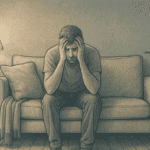Physical Signs of a Mental Breakdown: How the Body Reacts to Stress

A mental breakdown, also known as a “mental health crisis,” is experienced by roughly one in twenty adults in the United States every year.1 A mental breakdown can feel like your life is spinning out of control, with an overwhelming sense that things won’t get better.
Anxious feelings of stress, exhaustion, and hopelessness can limit your ability to function in daily activities. Plus, the signs of a mental health crisis aren’t limited to the mind – there are also physical signs of a mental breakdown. Fortunately, there are ways to overcome your situation and regain control of your life.
Understanding the physical symptoms of a nervous breakdown is a good place to start when deciphering between a temporary difficult time and a crisis in need of intervention. A mental health professional can talk to you or a loved one about symptoms and ensure you get the right help for your needs.
This article also works as a useful guide, covering how to spot the psychosomatic symptoms of breakdown and when to seek support. It does so by discussing:
- How stress affects the body and mind
- Physical symptoms of a nervous breakdown
- The differences between burnout and breakdown
- When and how to seek professional support

How Stress Affects the Body: The Mind-Body Connection
To break it down, the fight, flight, or freeze response proceeds as follows:3
The mind perceives the threat, triggering the nervous system- Adrenaline and cortisol are released from the adrenal gland
- Heart rate, blood pressure, and energy levels increase
- The body is now prepared to fight, flee, or freeze
- The recovery phase begins when the threat is gone and the nervous system rests
However, in contrast to our ancestors, threats no longer have to be physical to produce this reaction. In fact, research shows that psychological threats (such as fear of losing your job) elicit the same physical response. Additionally, people with mental health conditions, such as anxiety, may have a hypersensitive threat detection system, causing their bodies to stay in a stress-induced state longer. This prolonged state can lead to a variety of long-term health problems.2
For example, repeatedly experiencing the fight, flight, and flee response can lead to issues such as high blood pressure, sleep disturbances, and weakened immune function.2 Symptoms such as these can be used to detect an oncoming mental health crisis, allowing early intervention before complete emotional collapse.
Physical Symptoms of a Nervous Breakdown
A nervous breakdown or mental health crisis tends to be preempted by physical signs and symptoms. Knowing these warning signs equips you with the knowledge that something deeper may be going on and enables you to take action. If you are experiencing any of the following issues, it may be time to consult your mental health provider.
Muscle Tension and Pain
The body tends to hold tension from stress in the neck, shoulders, and lower back. When stress is prolonged, these areas can feel stiff, sore, shaky, or experience tremor-like movement.4 Additionally, muscle hypertension can lead to issues in the joints, increasing the risk of potential injury.
Headaches, Migraines, and Sensory Sensitivity
Hypertension in the neck and shoulders can lead to headaches and migraines, often referred to as “tension headaches.” As well as creating discomfort, migraines can impact the ability to see by either causing bright spots or an acute sensitivity to light. These forms of headaches have been shown to be the result of chronic emotional stress.5
Fatigue and Exhaustion
Prolonged or severe stress can throw off the delicate balance of the HPA axis (hypothalamic-pituitary-adrenal axis), or the neuroendocrine system. When this system dysfunctions, it’s common to experience feelings of fatigue and exhaustion. In fact, no matter how much you sleep, if your endocrine system is overworking, it’s likely you will always feel tired.7
Chest Pain and Cardiovascular Symptoms
As discussed, the stress response activates the cardiovascular system, increasing heart rate and blood pressure. However, when stress is chronic, ongoing pressure can damage blood vessels and arteries, leading to issues such as:2
Chest pain- Heart palpitations
- Arythmia (irregular heart rate)
- Persistent high blood pressure
- Heart disease
Digestive Disruption and Appetite Changes
Loss of appetite or an increase in appetite are both common responses to stress. This can lead to digestive issues, including upset stomach, diarrhea, and constipation. For this reason, chronic stress can lead to or exacerbate digestive illnesses such as Irritable Bowel Syndrome (IBS).6
Warning Signs of Burnout vs. Breakdown
Like nervous breakdowns, burnout is not classified as an illness or mental health disorder by itself. However, it is recognized as an occupational phenomenon by the World Health Organization (WHO) and can be brought on by working conditions like:8
- Excessive workload and long hours
- Lack of control over tasks and professional direction
- Conflicts with colleagues or superiors
- Poor work-life balance
While burnout is specifically associated with workplace stress, its physical and emotional symptoms can be similar to those of a nervous breakdown. Physical warning signs of burnout include:
- Chronic fatigue
- Sleep disturbances
- Headaches and migraines
- High blood pressure
- Irritability
- Muscle and joint pain
- Lack of motivation
- Social isolation
- Feelings of hopelessness
In contrast, nervous breakdowns are a state of emotional and psychological overload, but this level of stress goes beyond the workplace. However, when burnout is left untreated, it can lead to an emotional collapse or mental health crisis. For this reason, if your job is stressful to the point of causing burnout, you should seek interventions before the condition worsens.
When to Seek Help for a Breakdown
If you’re experiencing the emotional or physical symptoms of a nervous breakdown, it’s important to seek help as soon as possible. A mental health crisis doesn’t typically resolve on its own, and there are many avenues for support. You don’t need to cope alone or in silence.
Early intervention is key. While physical symptoms may be mild at first, without intervention or treatment, they can get significantly worse – and quickly. Yet support can prevent a full breakdown and minimize damage to your personal life and physical well-being.
So, whether you speak with your primary care physician, a mental health professional, a support group, or a helpline, taking this first step is an action toward minimizing suffering.
Get Support for a Nervous Breakdown
Your mental and physical health deserve the attention and support they need to recover. This is something many people in the face of a mental health crisis often struggle to accept.
At Mission Connection, we provide empathetic, comprehensive mental health care for our clients. Whatever your unique needs, we can tailor treatment to fit. Our team specializes in a variety of therapy options, which can be included in residential, outpatient, and telehealth packages. With our support, you can overcome the physical symptoms of a nervous breakdown while learning healthy ways to cope with stress.
If you’re concerned about your current mental health or feel like you’re experiencing a nervous breakdown, our team is available 24/7 to answer any questions or concerns. 96% of our clients say they are glad they entered into care at Mission Connection.
Join them by contacting us today and starting your journey to healing.

References
- National Alliance on Mental Illness. (2023, April). Mental health by the numbers. National Alliance on Mental Illness. https://www.nami.org/about-mental-illness/mental-health-by-the-numbers/
- Harvard Health Publishing. (2020, July 6). Understanding the stress response. Harvard Health Publishing. https://www.health.harvard.edu/staying-healthy/understanding-the-stress-response#:~:text=After%20the%20amygdala%20sends%20a,fully%20process%20what%20is%20happening.
- Mayo Clinic Staff. (2023, November 18). Stress basics. Mayo Clinic. https://www.mayoclinic.org/healthy-lifestyle/stress-management/basics/stress-basics/hlv-20049495#:~:text=When%20your%20brain%20perceives%20a,to%20a%20normal%2C%20relaxed%20state.
- National Institute of Neurological Disorders and Stroke. (2025, March 25). Tremor. National Institute of Neurological Disorders and Stroke. https://www.ninds.nih.gov/health-information/disorders/tremor#:~:text=Stress%2C%20anxiety%2C%20or%20fatigue%20may%20be%20associated%20with%20tremors.
- Spruill T. M. (2010). Chronic psychosocial stress and hypertension. Current hypertension reports, 12(1), 10–16. https://doi.org/10.1007/s11906-009-0084-8
- Patel N, Shackelford KB. (2025). Irritable Bowel Syndrome. StatPearls Publishing. https://www.ncbi.nlm.nih.gov/books/NBK534810/
- Huecker, M. R., Bhutta, B. S., & Dominique, E. (2025, January). Adrenal insufficiency. StatPearls – NCBI Bookshelf. https://www.ncbi.nlm.nih.gov/books/NBK441832/
- World Health Organization. (2019, May 28). Burn-out an occupational phenomenon: International Classification of Diseases. World Health Organization. https://www.who.int/news/item/28-05-2019-burn-out-an-occupational-phenomenon-international-classification-of-diseases






